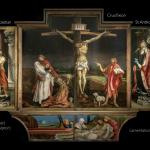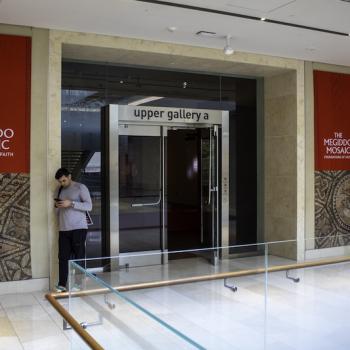
If you are not familiar with the name George Fox, I offer a small and incomplete introduction. Fox was known for his radical views on justice, equality, the Spirit-filled life, and peace. He faced much persecution for his beliefs and spent much of his life traveling and preaching, inspiring a movement that emphasized simplicity, integrity, and each individual’s relationship with the Spirit of God. Those who followed him were often referred to as Quakers (for their experiences with the Holy Spirit) or Friends (for their deep sense of honor for each other). He was someone who wanted people to have a relationship with God that brought about peace and joy. His thoughts on 1 Thessalonians 4:11 also show that.
If you have been around this blog awhile, you know that Leading A Quiet Life is a blog on Patheos that explores the command in 1 Thessalonians 4:11 to lead a quiet life. This blog represents a journey to discover the scriptural command to live life at a slower pace, to discover a simple life and faith, that embraces downward mobility in a chaotic world and church that is seemingly obsessed with excess. This week, I came across some reflections from George Fox, to his followers, with what he saw as crucial implications for leading a quiet life.
A Diligence in the Truth
From the Works or Epistles of George Fox in 1683, Fox writes that in 1 Thessalonians 4:11, we see “the diligence in the truth that the apostle exhorted the church to practice” (Fox, CCCLXXXIX, 1683). In hopes of exhorting that same practice, Fox goes on to offer commentary about this diligent truth in which he, like Paul, believes all followers of Jesus should be integrated into their lives and church communities. It is without a doubt that early on this faith conviction from the scriptures was an endearing conviction of those they call the Quakers or Friends.
Three Movements in this Passage
In his commentary, George Fox points out the three obvious movements within this scripture. I believe Fox saw an earnestness in the truth, and wanted that truth to be embodied in their movement with great conviction. Fox writes, “First, they are all to study to be quiet” (Fox, CCCLXXXIX, 1683). The Works of George Fox highlight this encouragement for a simple and peaceful existence. Secondly, Fox states, “They are all to do their own business, and work with their own hands, that they may lack nothing.” This instruction is about focusing just on their own responsibilities and earning their livelihood through their own efforts. Third, and lastly, Fox says Paul calls them to “walk honestly towards them that are without. And if they walk honestly towards them that are without, they must walk honestly to them that are within” (Fox, CCCLXXXIX, 1683). This statement, Fox interprets to be about conducting oneself with integrity towards those outside the community. Yet, the external alone is not enough, if they maintain integrity towards outsiders, they must also uphold it within (inside the church community and themselves).
A Second Time
It seems that either the Thessalonian Church had a problem understanding what Paul meant in 1 Thessalonians 4:11, or they had a problem with laziness overall because, in 2 Thessalonians 3:11, this way of living is addressed again. Fox points out that here Paul again has “some occasion to write to the Thessalonians upon the matter” (Fox 1831). Paul told them once, and now he is telling them again. Without a doubt, if this issue is addressed twice for the Thessalonian Church, Paul sees it as an intricate posture and practice of following the way, words, and works of Jesus. In 2 Thessalonians 3:11, Paul addresses this topic again as he writes that he has heard that “some among you are idle and disruptive. They are not busy; they are busybodies.” This is a poignant and direct line. Paul implies that there are an increasing amount of individuals in their church community that are not working with their hands, as he stated they should in 1 Thessalonians 4:11 – but rather they have only been busy with being involved and invested in the personal business and lives of others. In essence, Paul says, “Stay your line” in calling them to not be busybodies.
Be Apart
As Paul went on further, Paul continued his challenge by saying that those who have become busybodies need to listen up, he says we “command and urge in the Lord Jesus Christ to settle down and earn the food they eat” (2 Thessalonians 3:12). Paul invokes the name of Jesus to elevate this way of living. Paul reorients his command to live independently and not as a busybody, to lead a quiet life, by reorienting it into a vision to do good. With a significant emphasis, Paul ends his gentle rebuke with a challenging vision, “Never tire of doing what is good” (2 Thessalonians 3:13). This vision to do good is the why that should drive us on to lead a quiet life and not be a busybody. This is a way of life that sets us apart from others. Even more, he wants this simple way of life that is connected to the fruit of our labors to be integrated into life for everyone.
A Practice and Posture for Life
Seemingly, George Fox saw this challenge to lead a simple life as a significant practice for all followers of Jesus, but especially those who were referred to as Friends or Quakers. I state he saw significance in this practice and posture, because we find evidence of it in some of his introductory statements to his disciples, such as those in Charlestown (South Carolina). Fox writes to them, “we hear that Friends are in peace and quietness; and therefore you that have great liberty, both natural and spiritual…be valiant for God’s truth upon the earth, and spread it abroad, both among them that are called Christians and Indians, turning them from darkness to light” (Fox, CCCLXXXVI,1683). The proof that this was a significant piece for Fox was not only because it became a Quaker way of life, but also because George Fox takes this important connection to this posture and practice and connects it to the alarming and bold warning from Paul in 2 Thessalonians 3:14-15. It is here in 2 Thessalonians 3:14-15, that Paul writes, “Take special note of anyone who does not obey our instruction in this letter. Do not associate with them, in order that they may feel ashamed” (2 Thessalonians 3:14-15). Paul’s words seemingly appear to the whole 2 Thessalonians letter, and therefore Fox sees a challenge to be intentional with what company we keep and don’t keep (busybodies). The separation Paul suggests comes with a hope that the separation would bring about awareness and confession in their life. This wasn’t a call to treat someone as an enemy, an idea that would be foreign to the teachings of Jesus, but rather it is a practice that is about not counting him as “an enemy, but admonishing him as a brother” (2 Thessalonians 3:15).
Neither Dependent Spiritually or Physically
In his epistle, Fox is especially drawn to this statement from Paul in 2 Thessalonians 3:15. Right living or holiness was not only a value, but it was a corruptible, and by not leading a quiet life or by being around those that do not, we could find corruption in our faith and moral state. Fox knew that leading a quiet life was an important aspect of downward mobility which must be lived out faithfully by those who wish to follow Jesus in the shadowy and clamoring world of excess at our doors. Fox states that not leading a quiet life is certainly not like “those gross evils charged upon him as were upon some among the Corinthians” (Fox, CCCLXXXIX, 1683). Yet, at the same time, Fox doesn’t want us to undervalue this practice and posture of life. There is a call for him to come out of and away from those living an opposite way of life. He states Paul’s intent was “to keep all things clean and pure, and all diligent in their places, serving the Lord,” which undoubtedly and significantly for Fox meant not being “busybodies, and talkers about other men’s business; but to be quiet, and not idle” (Fox, CCCLXXXIX, 1683). Fox reinforces that the way of life for followers of Jesus is “doing their own business, that they may lack nothing; and so eat their own bread.” Offering an additional piece of commentary, Fox sees the bread that we are to eat as “natural and spiritual” in nature. In other words, both their physical and spiritual lives should not be dependent on anything but deeply connected to the divine, to God the Father, through the intentional commitment and intimate relationship each of us upholds and pursues in our faith journeys (Fox, CCCLXXXIX, 1683). Rather than meddling in the journeys of others, we must lead peaceful and industrious lives, ensuring our own sustenance both materially and spiritually, depending on no one else to do our work for us and model a prophetic way of dependence on God.
A Closing Challenge
In the reflections of George Fox, we unearth now ancient wisdom that echoes from the depths of history into our tumultuous present. Fox’s endorsement of 1 Thessalonians 4:11 is not only to illuminate the essence of leading a quiet life but also to remind us that this passage should become a compass guiding us through the labyrinth of distractions. Fox’s imperative is not only to simplicity, integrity, and diligence but even to be careful of what influences and individuals we allow in our life on this journey to lead a quiet life. Reminding us of Paul’s words in his Thessalonian letters, we see the ways that being intentional with this posture and practice means we also have to come out of and away from the people and places in which our lives give into the cacophony of excess and busyness. If we want to lead a quiet life, we must get away from those that pull us in another way, so we are not influenced and so that we can model a prophetic way of being in this world. Additionally, Fox reminds us that we need to go to the source, God the Father through God the Spirit, for ourselves, being dependent on no one else for our own spiritual formation, for this is what it means to be dependent on no one. Let us heed this call to diligent truth, to the peaceful rhythm of honest labor, and to the integrity that permeates our interactions both within and beyond our communities. For in the quietude of our lives, we find not only sustenance for ourselves but also seeds of transformation for the world around us.













